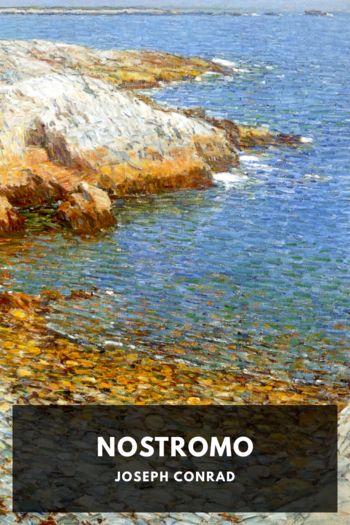Nostromo - Joseph Conrad (books to read fiction .TXT) 📗

- Author: Joseph Conrad
Book online «Nostromo - Joseph Conrad (books to read fiction .TXT) 📗». Author Joseph Conrad
“You go ahead in your own way, and I shall know how to help you as long as you hold your own. But you may rest assured that in a given case we shall know how to drop you in time.”
To this Charles Gould’s only answer had been: “You may begin sending out the machinery as soon as you like.”
And the great man had liked this imperturbable assurance. The secret of it was that to Charles Gould’s mind these uncompromising terms were agreeable. Like this the mine preserved its identity, with which he had endowed it as a boy; and it remained dependent on himself alone. It was a serious affair, and he, too, took it grimly.
“Of course,” he said to his wife, alluding to this last conversation with the departed guest, while they walked slowly up and down the corredor, followed by the irritated eye of the parrot—“of course, a man of that sort can take up a thing or drop it when he likes. He will suffer from no sense of defeat. He may have to give in, or he may have to die tomorrow, but the great silver and iron interests will survive, and some day will get hold of Costaguana along with the rest of the world.”
They had stopped near the cage. The parrot, catching the sound of a word belonging to his vocabulary, was moved to interfere. Parrots are very human.
“Viva Costaguana!” he shrieked, with intense self-assertion, and, instantly ruffling up his feathers, assumed an air of puffed-up somnolence behind the glittering wires.
“And do you believe that, Charley?” Mrs. Gould asked. “This seems to me most awful materialism, and—”
“My dear, it’s nothing to me,” interrupted her husband, in a reasonable tone. “I make use of what I see. What’s it to me whether his talk is the voice of destiny or simply a bit of claptrap eloquence? There’s a good deal of eloquence of one sort or another produced in both Americas. The air of the New World seems favourable to the art of declamation. Have you forgotten how dear Avellanos can hold forth for hours here—?”
“Oh, but that’s different,” protested Mrs. Gould, almost shocked. The allusion was not to the point. Don Jose was a dear good man, who talked very well, and was enthusiastic about the greatness of the San Tome mine. “How can you compare them, Charles?” she exclaimed, reproachfully. “He has suffered—and yet he hopes.”
The working competence of men—which she never questioned—was very surprising to Mrs. Gould, because upon so many obvious issues they showed themselves strangely muddleheaded.
Charles Gould, with a careworn calmness which secured for him at once his wife’s anxious sympathy, assured her that he was not comparing. He was an American himself, after all, and perhaps he could understand both kinds of eloquence—“if it were worthwhile to try,” he added, grimly. But he had breathed the air of England longer than any of his people had done for three generations, and really he begged to be excused. His poor father could be eloquent, too. And he asked his wife whether she remembered a passage in one of his father’s last letters where Mr. Gould had expressed the conviction that “God looked wrathfully at these countries, or else He would let some ray of hope fall through a rift in the appalling darkness of intrigue, bloodshed, and crime that hung over the Queen of Continents.”
Mrs. Gould had not forgotten. “You read it to me, Charley,”





Comments (0)